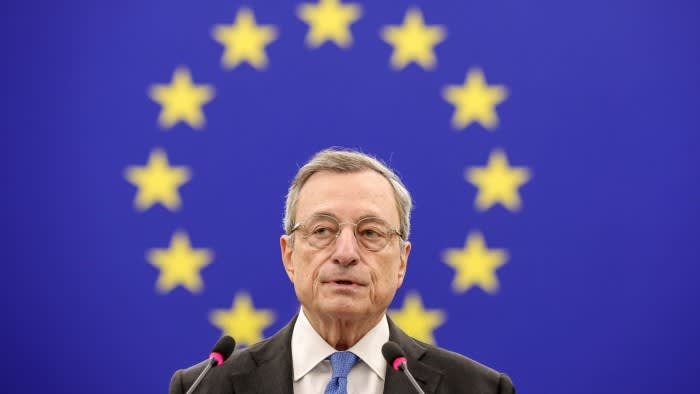Simply sign up to the EU economy myFT Digest — delivered directly to your inbox.
Ministers from central and eastern Europe have accused Mario Draghi of bringing an “old Europe” mindset to his proposals to boost EU competitiveness, saying his findings overlooked the continent’s most dynamic economies.
Officials in Latvia, Poland and the Czech Republic claimed the former Italian prime minister had been over reliant on expertise from the EU’s older member states, which skewed his conclusions and underplayed priorities in their region.
Viktors Valainis, Latvia’s economy minister, told the Financial Times that Draghi could have made clear that the “bureaucracy, countless regulations and the lack of dynamism” he identified “come directly from the core of the EU, the old traditions, the ‘Old Europe’ countries, which should be the first to change”.
Arguing Draghi had drawn up his report “without the opinions of eastern European countries”, Valainis warned misplaced priorities and solutions may lead to “the suppression of remaining dynamic countries” under regulation.
Draghi’s report for European Commission president Ursula von der Leyen was billed as a potential blueprint for EU economic reforms in coming years. He called on the EU to close an investment gap of €800bn a year to fund far-reaching reforms to prevent the bloc from falling behind the US and China.
The complaints over alleged bias reflect long-standing concerns in countries that joined the EU in 2004 about receiving second-tier treatment in European policymaking, including toleration of protectionism against their workers.
Ignacy Niemczycki, a Polish deputy minister for the economy, said Warsaw would push to liberalise the single market for services and for so-called cohesion spending to close the economic gap between regions — two priorities he felt were underplayed by Draghi.
Niemczycki, who will represent Poland at a ministerial meeting in Brussels on Thursday to discuss Draghi’s report, said his significant contribution should be treated as “just the beginning” of a profound reform debate involving all member states.
Niemczycki acknowledged the complaints of some economists and academics who said Draghi relied on “old EU” experts to help draw up his report, even though central and eastern Europe (CEE) had recently outpaced Germany and other larger EU economies. The Czech Republic and Poland also have the EU’s lowest unemployment rates.
Marcin Piątkowski, an economics professor at Kozminski University in Warsaw, is calling on CEE governments to prepare an alternative competitiveness report to reflect their views.
Although the list of people Draghi consulted for his report included few examples of individuals, companies and bodies from central and eastern Europe, a person close to the former Italian premier said it did not fully reflect the extent of his consultations.
Recommended
The person said the list was published to meet the commission’s transparency rules, which did not require registering meetings with member states and MEPs, including from central and eastern Europe.
Draghi and his team “have been in touch with a number of organisations that have a membership across the whole of the EU or represent companies based in various parts of central and eastern Europe”, the person said.
But one Czech government official highlighted “a stark contrast” between Draghi’s approach and that of Enrico Letta, another ex Italian premier who visited Prague three months before unveiling his report on improving the EU single market in April. Compared with those efforts, “Draghi didn’t travel”, the Czech official said.
Danuše Nerudová, a Czech economics professor and MEP, said having transitioned from Communism the region knows “what works and what doesn’t in terms of competitiveness”.
“I would have preferred to see a collaboration in the report’s authorship — bringing in an academic from central Europe would have added a valuable, alternative perspective.”
“Many countries in what we call ‘old Europe’ lack a competitive model and are still operating within frameworks that, in some cases, were created in the 1940s and have barely changed since,” she added. “Unfortunately they are imposing this model on the entire EU.”
Additional reporting by Paola Tamma in Brussels
Source link : http://www.bing.com/news/apiclick.aspx?ref=FexRss&aid=&tid=66f4f6ba1b1a49acbd76e989f0f8bd83&url=https%3A%2F%2Fwww.ft.com%2Fcontent%2Fc69137b1-213f-4aa8-8407-ad6fa5c6201d&c=495275835365603176&mkt=de-de
Author :
Publish date : 2024-09-25 21:00:00
Copyright for syndicated content belongs to the linked Source.
